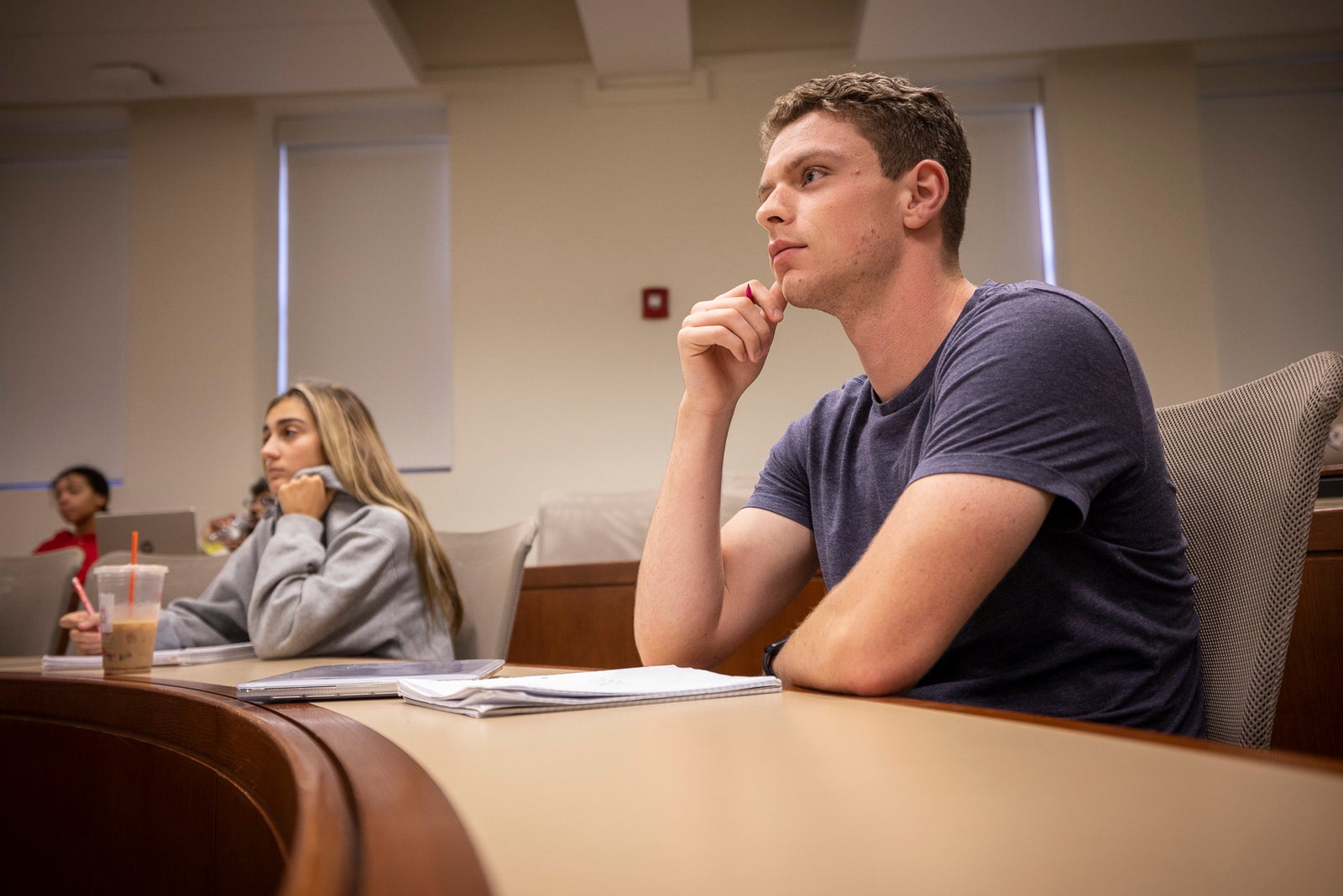Great writers do more than craft polished sentences. They are storytellers with the ability to draw readers into the heart of complex characters and conflicts.
Great writers are also ardent readers who are instructed and inspired by where literature has been, and in finding their own voice and refining their own talents. As a Writing, Editing & Publishing major at Emmanuel College, you will analyze the creative form and historical context of literary works and apply learned techniques to your own writing in the changing literary landscape. Alongside the study of literature, you will undertake intensive coursework in writing with the opportunity to focus on a particular genre, such as literary non-fiction, fiction, poetry or journalism. With a remarkable number of undergraduate student publications, our WEP program prepares our students to make their mark on the literary landscape and wherever they go professionally and in their lives.
A First-Class Experience
Get to know the people and programs that will define your academic journey.

Dr. Monique-Adelle Callahan Publishes Book of Poetry
"Through a combination of personal narrative and historical research, Rupture weaves together the history of enslaved women in the Americas and themes of life, love, and loss," writes publisher, Codhill Press.

Meet the Faculty
Our distinguished faculty publish, exhibit and research. Present, compose and chair. Inspire and collaborate.
The Curriculum
View the 2024-2025 Academic Catalog to find course titles, numbers and descriptions.
Requirements for B.A. in Writing, Editing & Publishing
1. Rhetorical Knowledge (one course)
- ENGL1205 Introduction to Literary Methods (AI-L) (LI)
2. British Literature (one course)
- ENGL2101 Romance and Conquest in British Literature: 900-1660 (AI-L) (LI)
- ENGL2102 Imperialism and Resistance in British Literature: 1800-Present (AI-L) (LI) (DM)
- ENGL2106 Irish Identities: Literature and Culture (AI-L) (LI)
- ENGL2321 Love and Gender in British Literature and Film
- ENGL2402 Shakespeare: Tragedies, Comedies, Histories and Romances (AI-L)
3. American Literature (one course)
- ENGL2304 American Voices I: U.S. Literature to 1865 (AI-L) (LI) (DM)
- ENGL2309 The Haves and the Have-Nots: American Authors on Money, Class and Power (AI-L) (LI)
- ENGL2410 African American Literary Giants (AI-L) (LI) (DM)
- ENGL2413 African American Literature: A Tradition of Resistance (AI-L) (LI) (DM)
- ENGL2604 American Voices II: U.S. Literature Since 1865(AI-L) (LI) (DM)
- ENGL3601 Crime Stories and American Culture
4. 2000-level or above English department offering (one course)
5. ENGL2504 Prose Writing
6. 2000-level or above English department writing course (one course)
- COMM2501 Journalism
- COMM2521 Public Relations and Persuasion (LI)
- COMM3501 Multimedia Storytelling
- COMM3801 Feature Writing
- ENGL2506 Poetry Writing (DM)
- ENGL2507 Fiction Writing
- ENGL3506 Advanced Poetry Writing
7. 3000-level or above English department offering (one course)
- COMM3701 Media Theory
- ENGL3303 Images of Masculinity
- ENGL3305 Satire
- ENGL3601 Crime Stories and American Culture
- ENGL3605 Global Literature and Film
- ENGL3703 Critical Theory and the Academy
- ENGL3991/ENGL3992 Special Topics I or II*
- ENGL4178 Directed Study
- *consult with advisor for appropriate section
8. 3000-level English department writing workshop (one course)
- ENGL3504 Advanced Prose Writing
9. Internship course (one course)
- ENGL4994/4995 Internship I & II
10. ENGL3405 Editing and Publishing a Literary Magazine
11. Capstone Experience (one course)
- ENGL4160 Writing Seminar
Students majoring in Writing, Editing and Publishing major are able to minor in Communications & Media Studies.
View the 2024-2025 Academic Catalog to find course titles, numbers and descriptions.
Requirements for Minor in Writing
1. ENGL2504 Prose Writing
2-5. Any four of the following courses (one at the 3000-level):
- COMM2501 Journalism
- COMM2521 Public Relations and Persuasion (LI)
- COMM3501 Multimedia Storytelling
- COMM3801 Feature Writing
- ENGL2506 Poetry Writing (DM)
- ENGL2507 Fiction Writing
- ENGL3405 Editing and Publishing a Literary Magazine
- ENGL3504 Advanced Prose Writing
- ENGL3506 Advanced Poetry Writing
- ENGL4160 Writing Seminar
The Writing, Editing, & Publishing major provides students with skills and expertise in various forms of writing and written communication. Students gain skills in nonfiction, prose, poetry and fiction writing. They receive guidance and experience with the publication process and engage in developing creating portfolios as well as a literary magazine. Courses focus on developing these skills and experiences through hands-on activity and workshops. Ultimately, the learning goals involve providing students with:
- Expertise in close reading and critical analysis
- Practice writing for diverse audiences
- Expertise in peer review and the incorporation of feedback
- Appreciation of the necessity for and practice of revision in successful creative writing and forms of written communication.
- Hands-on experience with publication processes and outcomes
- Guidelines for individualized, skilled creative processes in writing and thinking
What can I do with a degree in writing, editing and publishing?
A major in writing, editing, and publishing can lead to a variety of career paths in the fields of writing, media, and communications. Here are some potential career options:
- Writer or author: Writing majors can use their skills to become professional writers or authors, creating content for books, magazines, websites, or other publications.
- Editor: Editing majors can become professional editors, working in-house for publishers, magazines, or other media outlets, or working freelance as copy editors, proofreaders, or developmental editors.
- Publishing professional: Writing, editing, and publishing majors can work in the publishing industry in various roles, such as book or magazine publishers, literary agents, or marketing and publicity professionals.
- Technical writer: Technical writers create instruction manuals, user guides, and other technical documentation for products or services, which requires strong writing and communication skills.
- Content creator: Writing majors can work as content creators for digital media outlets, creating content for blogs, websites, social media, and other digital platforms.
- Copywriter: Copywriters create advertising or promotional materials, including slogans, ads, and product descriptions, which requires strong writing and communication skills.
- Journalist: Writing majors can become journalists, working for newspapers, magazines, or online publications to write news stories, feature articles, or investigative reports.
Overall, a major in writing, editing, and publishing can open up many exciting career opportunities in various fields, including media, publishing, advertising, and communications.
Writing Skills
- Creative Writing: Crafting engaging and original content, including fiction, non-fiction, and poetry.
- Technical Writing: Creating clear and concise manuals, guides, and other technical documents.
- Copywriting: Writing persuasive content for advertisements, marketing materials, and web content.
- Content Writing: Developing articles, blog posts, and social media content for various platforms.
- Journalistic Writing: Reporting news and creating feature stories for print, broadcast, and digital media.
Editing Skills
- Proofreading: Identifying and correcting grammatical, punctuation, and spelling errors.
- Copy Editing: Improving clarity, coherence, and style while ensuring consistency and accuracy.
- Developmental Editing: Providing feedback on structure, content, and flow of manuscripts and articles.
- Line Editing: Focusing on sentence structure, word choice, and readability.
- Fact-Checking: Verifying information for accuracy and credibility.
Publishing Skills
- Project Management: Overseeing the production process from manuscript to published work.
- Digital Publishing: Understanding e-books, online platforms, and digital content distribution.
- Print Production: Knowledge of printing processes, paper types, and binding methods.
- Marketing and Promotion: Developing strategies to promote books and authors through various channels.
- Acquisitions: Identifying and acquiring new manuscripts and projects for publication.
Technical and Digital Skills
- SEO (Search Engine Optimization): Optimizing content for search engines to increase visibility.
- CMS (Content Management Systems): Using platforms like WordPress, Drupal, and Joomla for content creation and management.
- Social Media Management: Leveraging social media platforms to promote content and engage with audiences.
- Graphic Design: Basic skills in design software like Adobe Creative Suite (Photoshop, InDesign, Illustrator) for creating visuals.
- Web Analytics: Understanding tools like Google Analytics to measure content performance and audience engagement.
Research Skills
- Information Gathering: Conducting thorough research from credible sources.
- Data Analysis: Interpreting data to create compelling and factual content.
- Interviewing: Conducting interviews to gather firsthand information and quotes.
Soft Skills
- Communication: Strong verbal and written communication skills for collaboration and feedback.
- Time Management: Ability to meet deadlines and manage multiple projects simultaneously.
- Attention to Detail: Ensuring accuracy and quality in all aspects of writing, editing, and publishing.
- Adaptability: Being open to feedback and willing to revise and improve content.
- Critical Thinking: Analyzing information and making well-informed decisions.
Networking and Industry Knowledge
- Industry Trends: Keeping up with the latest trends and developments in writing, editing, and publishing.
- Networking: Building relationships with authors, editors, publishers, and other industry professionals.
- Professional Development: Continually improving skills through workshops, courses, and conferences.
These skills can significantly enhance a writing, editing, and publishing major’s employability and effectiveness in their chosen career path.
Where Essential Values and Skills Meet the Real World
Along with areas of knowledge and major requirements, you will cultivate essential values in the classroom and complete two courses in each area:
- Social Justice (SJ): Develop knowledge, skills, values and motivation to participate beneficially in activities of personal and public concern.
- Diversity & Multiculturalism (DM): Understand the complexity of identity the historical truths of different cultural perspectives to address bias and examine contemporary social issues.

One hundred percent of Emmanuel students complete an internship as part of the core curriculum. In a city as dynamic as Boston, your options are bound only by the limits of your curiosity.
Students from the English, Writing & Communications Department intern with major media outlets such as GBH, WHDH-TV and The Globe, as well as in editorial or content roles with journals and major publishers, nonprofit organizations or Boston-based tech startups.

In all majors, the Capstone Experience involves completing a significant piece of work that requires the integration and application of learning from multiple courses.
In the Capstone Experience, EWC students engage in rigorous class discussions, participate in group or individual presentations, and write a major research paper. Writing, Editing & Publishing students revise work produced in previous courses and submit for considerations at journals, magazines, anthologies and contests. Students also complete a reflection of their educational goals of the program.

Humanities & Social Sciences Spotlight
See more news and stories related to the School of Humanities & Social Sciences


